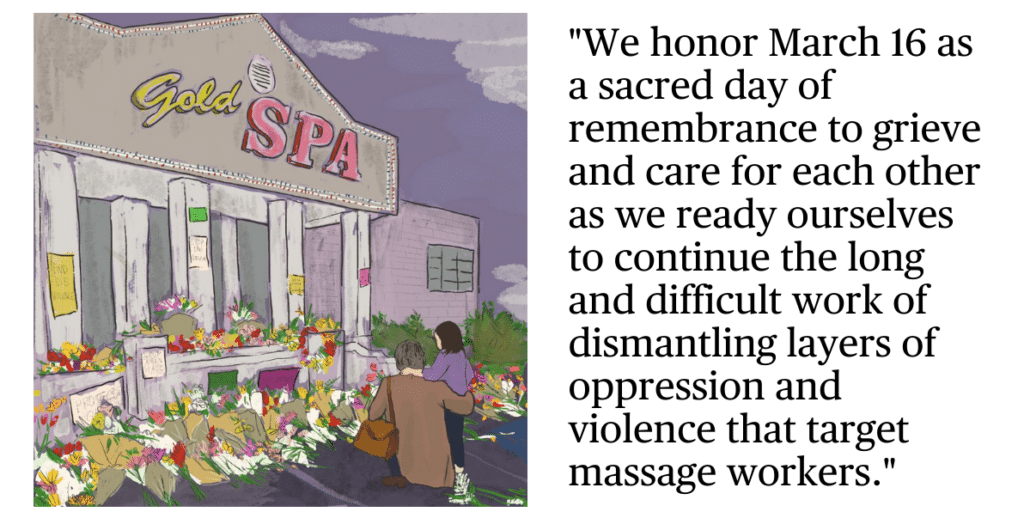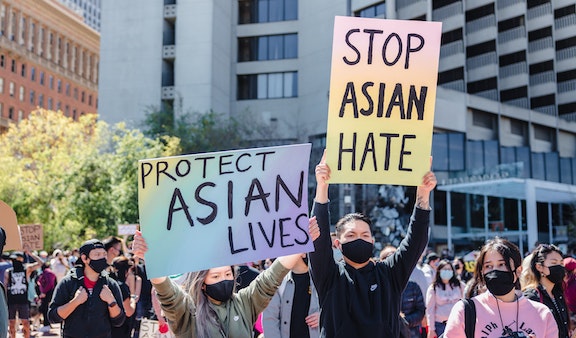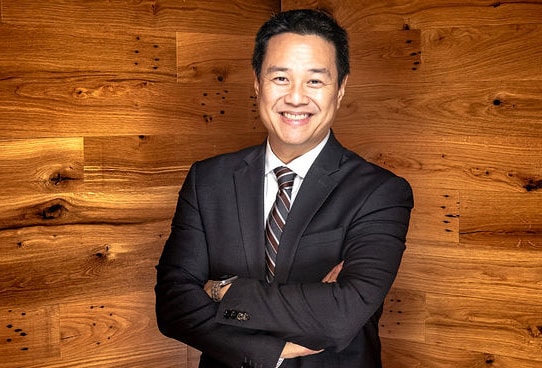Sustaining Support for Asian Americans and Pacific Islanders
A year ago, a man with a handgun drove to three spas in Atlanta and murdered eight people, including six Asian women. The heinous crime sparked national outrage and heightened awareness about anti-AAPI hate, which had spiked after President Trump and other high-profile figures began to use racist, anti-Asian rhetoric in relation to COVID-19. Leaders from all sectors—government, the private sector, nonprofits, celebrities—condemned the rise of harassment, discrimination, and violence against Asian Americans and Pacific Islanders (AAPIs). Since then, we’ve seen the launch of several major initiatives to thwart these types of attacks.

Photo and quote courtesy of Asian Americans Advancing Justice Atlanta via Twitter.
Join Surdna in signing AAAJA’s collective statement calling for reflection and action.
As a Chinese American, I was also deeply affected by these murders and other horrific incidents. Like many people of color, I’ve endured a lifetime of taunts and threats, but what we’ve witnessed during the pandemic is unprecedented. The rise of anti-Asian sentiment has created a hostile and unsafe environment, especially for women. Though I’ve been active on issues pertaining to AAPI communities over the years, I decided that I needed to do more.
To begin with, I’ve joined several initiatives to fight discrimination and violence against AAPIs. In my role as the President of the Surdna Foundation, I’ve also sought to address the deeper systemic issues affecting AAPIs, because I believe that the rise of anti-Asian sentiment demands sustained, long-term solutions.
First, I’ve supported efforts to ensure a sense of belonging for AAPIs, who are often regarded as “perpetual foreigners.” Even some of my family members have bought into this harmful narrative, explicitly or tacitly encouraging relatives to keep our heads down and not cause trouble. That must end. It’s time to bury the narrative of the Asian who’s obedient and doesn’t rock the boat. Instead, AAPIs must assert that we all belong. We have the right and obligation to have a voice and be seen in all aspects of our society, including our democratic system, industry sectors, cultural representations, and other corners of the public square. To that end, much of Surdna’s grantmaking to AAPI groups has focused on ensuring robust civic participation, helping business owners who’ve been disproportionately hard hit during the pandemic, and supporting AAPI artists and cultural organizations, who are commonly overlooked by foundations.
Second, I won’t be satisfied until America becomes safe and welcoming for AAPIs and all people, especially for those who have historically been oppressed, excluded, or made to feel “less than” or “othered” in our society. Frankly, I don’t think it’s pragmatic to expect that acceptance of one demographic group will ever be sustained unless belonging—for everyone—becomes our cultural norm. Therefore, one of my top priorities is to promote multi-racial solidarity, as well as solidarity with trans people, individuals experiencing homelessness, immigrants and refugees, people with disabilities, and other members of our communities. Given Surdna’s mission to advance social justice and racial equity, our grantmaking reflects these principles of belonging and intersectional solidarity. I’m proud that I helped draft AAPIP’s Call for Solidarity and Collective Action, which garnered over 700 signatories. Since then, there has been an increase in philanthropic giving to AAPI organizations and communities. But it’s too early and the data are too spotty to assess whether those gains will be sustained over time.
I challenge our foundation colleagues and donors to increase their giving to initiatives that support AAPIs and multi-racial solidarity over the long term.
Finally, I recognize that any one person’s—or one foundation’s—actions aren’t nearly enough to address the deep, systemic challenges that create hostile and unsafe environments for AAPIs. So I’ve devoted more time to working with colleagues in philanthropy, government, and other fields to engage in collective action, support leadership development, and join forces to advocate for change. I’m fortunate to serve on the boards and advisory bodies of a number of AAPI organizations, including Asian Americans/Pacific Islanders in Philanthropy (AAPIP), The Asian American Foundation, and the AAPI Civic Engagement Fund. In addition, AAPIP has been convening AAPI philanthropy CEOs, which not long ago would have turned up just a handful of foundation presidents. Today, there are dozens of us who are working together and seeking to develop and promote shared goals. I’m grateful to be part of this CEO cohort and encouraged that our numbers are growing.

Much more needs to be done. The recent murders of Christina Yuna Lee and Michelle Go in New York City, and Friday’s horrific attack on an Asian woman in Yonkers, NY are evidence that assaults on AAPIs are continuing unabated. I’m committed to ensuring that AAPI voices are represented in the responses to this crisis. I urge my fellow Asian Americans and Pacific Islanders to not limit ourselves to demanding the usual short-term measures, such as crackdowns on homeless people and additional policing. Those types of responses may bring some fleeting comfort, but they won’t be effective in addressing the root causes of our problems. Instead, we need to prioritize thoughtful structural reform of public safety, homelessness, mental health, and restorative approaches to justice. Together, we must also combat corrosive narratives that are grounded in racism and xenophobia. I am personally resolved to supporting long-term reforms, and Surdna’s future grantmaking to AAPI groups will reflect that commitment.
Meanwhile, there are other major issues that our AAPI communities need to address, such as the hysteria about critical race theory, which gags the teaching of the Asian American experience and the history of Black, Indigenous, and other people of color in this country. We must confront anti-Black racism within the AAPI community. Our nation must also remedy the structural scarcity of quality education. All of these issues require greater civic engagement, voice, cultural representation, and funding for AAPI people, community leaders, and organizations. To honor the memory of Xiaojie Tan, Daoyou Feng, Hyun Jung Grant, Suncha Kim, Soon Chung Park, and Yong Ae Yue, as well as Delaina Ashley Yaun and Paul Andre Michels, I remain deeply committed to doing my part to address the AAPI community’s short-term needs while also supporting efforts to tackle the structural root causes of our challenges.
In solidarity,
Don Chen
President
Surdna Foundation


